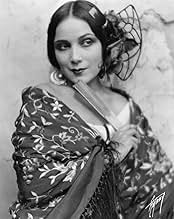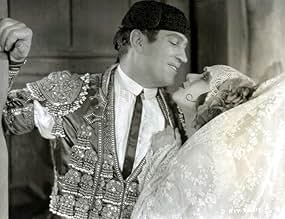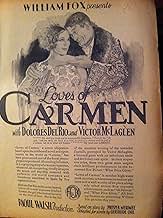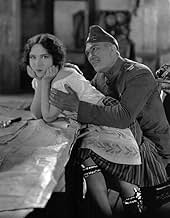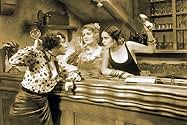Ajouter une intrigue dans votre langueProsper Merimee's story of a Spanish gypsy girl working in a cigar factory, and the rivalry for her affections among several men,including a soldier who helps her escape from jail and a fame... Tout lireProsper Merimee's story of a Spanish gypsy girl working in a cigar factory, and the rivalry for her affections among several men,including a soldier who helps her escape from jail and a famed bullfighter who at first finds her obnoxious.Prosper Merimee's story of a Spanish gypsy girl working in a cigar factory, and the rivalry for her affections among several men,including a soldier who helps her escape from jail and a famed bullfighter who at first finds her obnoxious.
- Récompenses
- 2 victoires au total
Dolores Del Río
- Carmen
- (as Dolores del Rio)
Italia Frandi
- Gypsy Girl
- (non crédité)
Venezia Frandi
- Gypsy Girl
- (non crédité)
Jerry Madden
- Little Boy
- (non crédité)
Histoire
Le saviez-vous
- ConnexionsFeatured in Life in Hollywood No. 5 (1927)
Commentaire à la une
THE LOVES OF CARMEN (Fox, 1927), directed by Raoul Walsh, reunites Walsh with his WHAT PRICE GLORY (1926) leading players of Dolores Del Rio and Victor McLaglen in a story based on Prosper Merimee's classic story, "Carmen," that later served as an 1875 Georges Bizet opera. For those unfamiliar with the plot, this edition, one of many, comes across as more faithful to the aforementioned properties from which it is based.
Set in 1820s Seville, Carmen (Dolores Del Rio), is a gypsy girl working in a cigar factory who is loved by Lieutenant Don Jose (Don Alvarado), as well as half of male population of Spain. She meets her match with Escamillo (Victor McLaglen), a famous matador and the idol of many women. Carmen makes every attempt to attract his attention, but all she gets for her trouble is him picking her up and throwing her into a puddle of water. To make her day complete, Carmen gets into an argument with one of her female co-workers followed by a physical fight with another after being called "an angel from the gutter." This, of course, lands her in jail for disturbing the peace. Carmen's sentence is cut short as Don Jose arranges for Carmen's escape. For this he is placed on guard duty as punishment by his superior officer, Morales (Jack Bastian). He later faces a court martial for deserting his post to be alone with Carmen in her place of residence. After Don finds Morales with Carmen, the two men duel it out with swords, with the commander being killed in the process. For this, Don seeks refuge in the mountains, hiding in the gypsy camp with Carmen. As Carmen begins to become bored with Don, she breaks away from him to watch Escamillo in the bullring. This time she captures his attention, eventually becoming his mistress while Don Jose, a disgrace to his regiment, learns of this and goes into a jealous rage.
Other members of the cast consist of not so well known actors including Nancy Nash (Michela); Rafael Valverda (Miguel); Mathilde Comont (Emilia); Carmen Costello (Tersa); and Fred Kohler Sr. (The Gypsy Chief).
Mexican actress Dolores Del Rio excels in her role as Carmen, as does fellow Hispanic Don Alvarado playing Don Jose. The tall and rugged Victor McLaglen might seem an unlikely choice as the bullfighter, yet, under Walsh's direction, gets by with his role. The sets and costumes capture the mood and period where it's set, but in spite of this being a satisfactory production, it's close to being virtually unknown to film scholars. THE LOVES OF CARMEN was once a lost item from cinema history, with no prints known to exist until its long awaited discovery in an European archive and restoration from film department staff members of Museum of Modern Art in New York City made it a reality to be shown again. Aside from limited public showings at the museum, THE LOVES OF CARMEN served as the sixth movie in the eight-week series of "Lost and Found" broadcast during the summer months on New York City's own public broadcasting station, WNET, Channel 13, hosted by Richard Schickel. Upon the conclusion of its July 29, 1978 television premiere, equipped with piano score at a length of 83 minutes, Schickel talked briefly about other Carmens of the screen, including a 1909 French film, two 1915 releases, one featuring opera star Geraldine Farrar under the direction of Cecil B. Demille for Paramount, and another starring Theda Bara directed by Raoul Walsh, along with comedian Charlie Chaplin's interpretation in the featurette spoof, BURLESQUE ON CARMEN (1916) with Edna Purviance. (The most famous remakes, however, happens to be THE LOVES OF CARMEN (Columbia, 1948) with the alluring Rita Hayworth and the miscast Glenn Ford; and the modern-day opera with an all black cast, CARMEN JONES (20th Century-Fox, 1954) featuring Dorothy Dandridge and Harry Bellafonte.) Schickel also commented on Don Alvarado being one of many actors during the silent era to be promoted as another Latin lover type like Rudolph Valentino (1895-1926), yet failed living up to that legendary performer.
Regardless of its rediscovery and restoration, THE LOVES OF CARMEN hasn't been seen much since its 1978 television presentation, and it doesn't seem likely that it will circulate again. With so many Carmens on stage and screen, what's one more addition to video, DVD or cable television broadcasts with the one and only Dolores Del Rio silently playing a flirt with her love and passion for destroying those around her, especially the men in her life. (***)
Set in 1820s Seville, Carmen (Dolores Del Rio), is a gypsy girl working in a cigar factory who is loved by Lieutenant Don Jose (Don Alvarado), as well as half of male population of Spain. She meets her match with Escamillo (Victor McLaglen), a famous matador and the idol of many women. Carmen makes every attempt to attract his attention, but all she gets for her trouble is him picking her up and throwing her into a puddle of water. To make her day complete, Carmen gets into an argument with one of her female co-workers followed by a physical fight with another after being called "an angel from the gutter." This, of course, lands her in jail for disturbing the peace. Carmen's sentence is cut short as Don Jose arranges for Carmen's escape. For this he is placed on guard duty as punishment by his superior officer, Morales (Jack Bastian). He later faces a court martial for deserting his post to be alone with Carmen in her place of residence. After Don finds Morales with Carmen, the two men duel it out with swords, with the commander being killed in the process. For this, Don seeks refuge in the mountains, hiding in the gypsy camp with Carmen. As Carmen begins to become bored with Don, she breaks away from him to watch Escamillo in the bullring. This time she captures his attention, eventually becoming his mistress while Don Jose, a disgrace to his regiment, learns of this and goes into a jealous rage.
Other members of the cast consist of not so well known actors including Nancy Nash (Michela); Rafael Valverda (Miguel); Mathilde Comont (Emilia); Carmen Costello (Tersa); and Fred Kohler Sr. (The Gypsy Chief).
Mexican actress Dolores Del Rio excels in her role as Carmen, as does fellow Hispanic Don Alvarado playing Don Jose. The tall and rugged Victor McLaglen might seem an unlikely choice as the bullfighter, yet, under Walsh's direction, gets by with his role. The sets and costumes capture the mood and period where it's set, but in spite of this being a satisfactory production, it's close to being virtually unknown to film scholars. THE LOVES OF CARMEN was once a lost item from cinema history, with no prints known to exist until its long awaited discovery in an European archive and restoration from film department staff members of Museum of Modern Art in New York City made it a reality to be shown again. Aside from limited public showings at the museum, THE LOVES OF CARMEN served as the sixth movie in the eight-week series of "Lost and Found" broadcast during the summer months on New York City's own public broadcasting station, WNET, Channel 13, hosted by Richard Schickel. Upon the conclusion of its July 29, 1978 television premiere, equipped with piano score at a length of 83 minutes, Schickel talked briefly about other Carmens of the screen, including a 1909 French film, two 1915 releases, one featuring opera star Geraldine Farrar under the direction of Cecil B. Demille for Paramount, and another starring Theda Bara directed by Raoul Walsh, along with comedian Charlie Chaplin's interpretation in the featurette spoof, BURLESQUE ON CARMEN (1916) with Edna Purviance. (The most famous remakes, however, happens to be THE LOVES OF CARMEN (Columbia, 1948) with the alluring Rita Hayworth and the miscast Glenn Ford; and the modern-day opera with an all black cast, CARMEN JONES (20th Century-Fox, 1954) featuring Dorothy Dandridge and Harry Bellafonte.) Schickel also commented on Don Alvarado being one of many actors during the silent era to be promoted as another Latin lover type like Rudolph Valentino (1895-1926), yet failed living up to that legendary performer.
Regardless of its rediscovery and restoration, THE LOVES OF CARMEN hasn't been seen much since its 1978 television presentation, and it doesn't seem likely that it will circulate again. With so many Carmens on stage and screen, what's one more addition to video, DVD or cable television broadcasts with the one and only Dolores Del Rio silently playing a flirt with her love and passion for destroying those around her, especially the men in her life. (***)
Meilleurs choix
Connectez-vous pour évaluer et suivre la liste de favoris afin de recevoir des recommandations personnalisées
Détails
- Date de sortie
- Pays d’origine
- Langue
- Aussi connu sous le nom de
- The Loves of Carmen
- Lieux de tournage
- Société de production
- Voir plus de crédits d'entreprise sur IMDbPro
Box-office
- Montant brut aux États-Unis et au Canada
- 485 450 $US
- Durée1 heure 30 minutes
- Mixage
- Rapport de forme
- 1.33 : 1
Contribuer à cette page
Suggérer une modification ou ajouter du contenu manquant

Lacune principale
By what name was Loves of Carmen (1927) officially released in Canada in English?
Répondre
